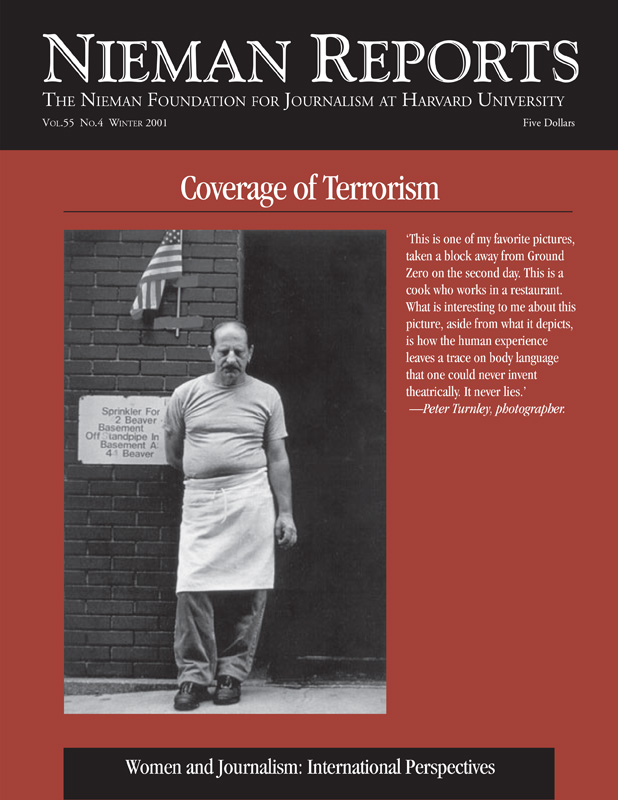In October, Indian author and journalist Ammu Joseph presented a lecture on covering gender to students at the Asian College of Journalism in Chennai, India. An essay, based in part on her lecture, was published on The Hoot (www.thehoot.org), the Web site of the Media Foundation in Delhi, India. Excerpts from Joseph’s essay follow:
Recent critiques of media coverage of the aftermath of September 11 have dealt with a number of ethical issues that confront the media during times of conflict: patriotism vs. accuracy and fairness, official vs. self-censorship, national vs. public interest, majority vs. minority opinion, and so on. However, little attention seems to have been paid to the media and gender in the context of terrorism and war….
Ever since the so-called U.S.-led/British-backed attack on Afghanistan began on October 7, I have been vaguely conscious of a particular anomaly in the media’s coverage of the war. I recognized what it was while watching an October 24 television report on the gathering of Afghan leaders in Peshawar for a discussion on the post-war scenario in Afghanistan: There were hardly any women in any of the reports (apart from female journalists, who have been quite conspicuous by their presence).
It seemed to me quite extraordinary that anyone could look at that overflowing hall in Peshawar and not notice that there was not a single woman there…. I was amazed that journalists covering the event did not find it remarkable that the future of a nation was being discussed without even one representative of one half of its citizenry…. Especially when everyone knows that the women of Afghanistan and their children have paid the highest price for the wars that have been raging in their country for two decades—wars that they have had no role in waging….
The gender angle to war coverage cannot be seen exclusively in terms of reports on violations of women’s right to physical security, including rape, sexual harassment, and sexual exploitation—widespread and serious as these tend to be. It needs to also take into account women’s heightened experience of violence and trauma during periods of conflict—both physical and psychological, both within the home and outside it. It needs to spot- Women, War and the Media light the ways in which “culture” and “tradition” are often used during times of political tension and strife to curtail women’s human rights. It needs to take note of the additional social and economic burdens placed on women’s shoulders at such times, when they often find themselves solely responsible for their families (including the very old, the very young, and the sick) under circumstances where even food and shelter are not always available. And it certainly needs to focus attention on women’s political rights, including their right to participate in decision-making and governance.
If women hold up half the sky during peacetime, they hold up even more of it during wartime. This is surely a fact that the media have a responsibility to recognize and report. One way to begin is to acknowledge women as legitimate and vital sources of information, as well as insight, even in the context of war, the ultimate manifestation of machismo.
Recent critiques of media coverage of the aftermath of September 11 have dealt with a number of ethical issues that confront the media during times of conflict: patriotism vs. accuracy and fairness, official vs. self-censorship, national vs. public interest, majority vs. minority opinion, and so on. However, little attention seems to have been paid to the media and gender in the context of terrorism and war….
Ever since the so-called U.S.-led/British-backed attack on Afghanistan began on October 7, I have been vaguely conscious of a particular anomaly in the media’s coverage of the war. I recognized what it was while watching an October 24 television report on the gathering of Afghan leaders in Peshawar for a discussion on the post-war scenario in Afghanistan: There were hardly any women in any of the reports (apart from female journalists, who have been quite conspicuous by their presence).
It seemed to me quite extraordinary that anyone could look at that overflowing hall in Peshawar and not notice that there was not a single woman there…. I was amazed that journalists covering the event did not find it remarkable that the future of a nation was being discussed without even one representative of one half of its citizenry…. Especially when everyone knows that the women of Afghanistan and their children have paid the highest price for the wars that have been raging in their country for two decades—wars that they have had no role in waging….
The gender angle to war coverage cannot be seen exclusively in terms of reports on violations of women’s right to physical security, including rape, sexual harassment, and sexual exploitation—widespread and serious as these tend to be. It needs to also take into account women’s heightened experience of violence and trauma during periods of conflict—both physical and psychological, both within the home and outside it. It needs to spot- Women, War and the Media light the ways in which “culture” and “tradition” are often used during times of political tension and strife to curtail women’s human rights. It needs to take note of the additional social and economic burdens placed on women’s shoulders at such times, when they often find themselves solely responsible for their families (including the very old, the very young, and the sick) under circumstances where even food and shelter are not always available. And it certainly needs to focus attention on women’s political rights, including their right to participate in decision-making and governance.
If women hold up half the sky during peacetime, they hold up even more of it during wartime. This is surely a fact that the media have a responsibility to recognize and report. One way to begin is to acknowledge women as legitimate and vital sources of information, as well as insight, even in the context of war, the ultimate manifestation of machismo.



